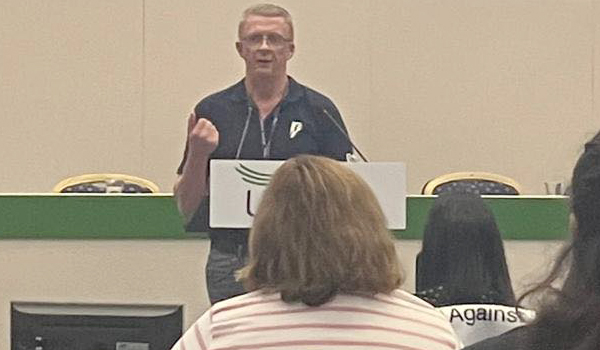Unison backs the STEP campaign to tackle policing’s suicide crisis
The policing arm of Unison has voted to support the STEP (Suicide Trauma Education Prevention) campaign, in the first commitment from a national policing body to raising awareness of suicide prevention and pressing for more support from police leaders.
STEP’s Spencer Wragg received by a standing ovation for his emotional speech at the Unison Police, Probation and Cafcass Service Group Conference on Friday (October 10) – World Mental Health Day.
Unison members voted unanimously to join the campaign and take action, including surveying police branches to see what trauma support currently exists for their members, who this is offered to and when; and to promote the aims of the STEP campaign within all branches.
Mr Wragg told delegates: “Suicide is truly non-discriminatory. It doesn’t care if you’re a call handler, if you’re a chief constable, it doesn’t care where you live. It doesn’t matter who you love, what your religion is, even what football team you support. It affects everybody in society.”
He said that everyone suffers from life stresses, but the difference was that the average officer attended up to 600 traumatic incidents over a 30-year career.
He told Unison delegates: “All those traumatic incidents start in the control room… I don’t know how you deal with that – you have to listen to a distressing call and send an officer towards it.”
Mr Wragg emphasised that he was not saying that police officers and staff should not deal with traumatic incidents – ”because we signed up to the police to help people at the worst times of their lives” – but that there needed to be more support.
He said: “Policing is about saving lives and there is no shame in doing what we can to protect our own lives as well.”
It emerged recently that 100 police officers and staff have taken their own lives in the past three years in a growing mental health crisis.
Mr Wragg referred to police officers’ and staff members’ “superhero masks”, which people can put on to deal with traumatic incidents at work, but then struggled to remove at home. He said: “Eventually they crumble.”
He also talked about the fact that 60 to 70 per cent of officers who die by suicide are going through misconduct proceedings.
“We know that on occasions officer’s and staff will need to be managed out of the force, but that proportionality of investigations needs to be considered more.”
He added: “Misconduct is definitely an area within policing that we are not getting right in terms of looking after people… even if their actions are indefensible or even reprehensible, we need to help those people exit the organisation in the best way possible.”
Mr Wragg shared that he had come very close to taking his own life six years ago.
When he became chair of Hampshire Police Federation earlier this year, he started talking more about suicide prevention in public and put a social media post out, which gained a lot of attention. Only three weeks later Mr Wragg found himself supporting a police family through the devastation of losing a loved one.
He was moved to start the STEP campaign, but he emphasised that “this isn’t just a Hampshire issue”.
The campaign aims to break the stigma of suicide so that more people come forward to seek help. Another key element is mandatory debrief sessions for all officers who have attended a traumatic incident.
Most recently, the campaign has succeeded in getting the Stay Alive app, developed by the Grassroots Suicide Prevention Charity, onto 8,000 officers’ and police staff work phones in Hampshire and Thames Valley.
Mr Wragg said he wanted all forces to roll this out, and urged Unison delegates to push senior officers to do so.
“It doesn’t cost them a penny,” he said. “If we get it on every single phone within policing that could be the best part of a quarter of a million phones.
“This is an app that I hope you never need, but if you do, it’s there. It gives you instant access to help in a crisis, and if someone at home, a colleague at work, or a friend is in crisis, it also gives you signposting to help them. So let’s try to get it through every IT department and Chief Constable in the country.”
Mr Wragg said that now Unison had come on board with the STEP campaign, he hoped it would be picked up by other national policing bodies and that real progress would be made.
He said: “The deaths continue, that’s the reality of it.”
He highlighted “the pockets of good work” that are going on around the country, the National Federation which is looking at making it mandatory for forces to record officer and staff suicides. The National Police Chiefs’Council for putting STEP on Chiefs’ Net, the Oscar Kilo mental health support line, but also smaller organisations such as Trojan wellbeing for pushing the message out and individual social media influencers such as Ian Cook, Ben Pearson, Adam Conn, Dave Thomas and many more.
He called for “a national coordination of the good work that is going on in order to ensure a more joined up and effective approach. It doesn’t matter to me who coordinates this but more needs to be done to prevent officers and staff from taking their own lives.”
Mr Wragg concluded: “Unison, you are the first national organisation to actually recognise this and want to do something about it. Thank you. That’s massive and a huge testament to you.”
Unison said it is important for officers and staff who are struggling to know they are not alone, and that there are people there to help.
This includes, for immediacy, the Mental Health Support line from Oscar Kilo 0300 131 2789.


